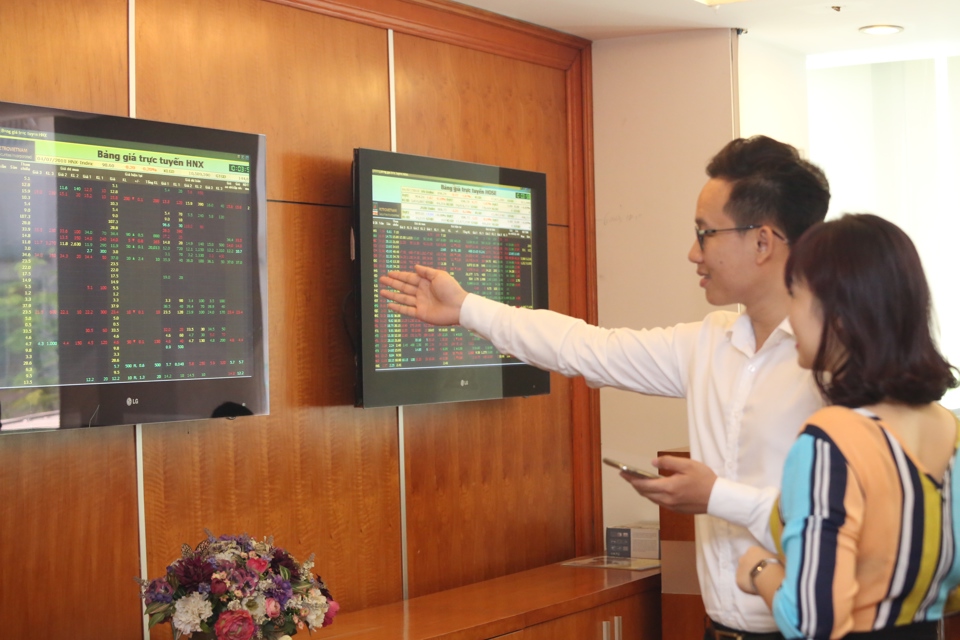Vietnam’s stock market set for strong year-end growth
The projected P/E ratio for the VN-Index this year is 11.5, below the 5-year average of 13.4, potential for the benchmark to rise in the second half of the year and 2025.
Experts believe that attractive valuations and the return of foreign investors will drive positive stock market performance at year-end.
| Investors at a securities company in Hanoi. Photo: Pham Hung/The Hanoi Times |
Building on the recovery from November 2023, the VN-Index remained positive in the first half of this year. Despite facing short-term correction in April and a 1.3% drop in June, the index remained over 10% higher than at the beginning of the year.
Although this growth is modest compared to the major Asian markets and Wall Street (with the Nasdaq and S&P 500 up 26.35% and 18.52%, respectively), it has outperformed other frontier and emerging markets hit by foreign investor sell-offs.
"From macroeconomic factors to market-specific elements, everything points to a potentially positive outlook for the stock market in the second half of the year," noted Yuanta Securities in a report.
Analysts from various securities companies expect the market to continue its upward trend as well. SSI Research's mid-year strategy report suggests that stocks will continue to rise, despite existing risks. The projected P/E ratio for the VN-Index this year is 11.5, below the 5-year average of 13.4. "At this valuation level, the VN-Index still has the potential to rise in the second half of the year and into 2025," SSI Research analysts commented.
MiraeAsset Securities predicts the VN-Index will reach 1,320-1,340 points, while Phu Hung Securities (PHS) even expects the index to hit 1,400 points in the second half of the year.
According to Yuanta, a potential interest rate cut by the US Federal Reserve (Fed) in September could have a positive impact on the market's exchange rates and capital flows. "As the strength of the US dollar fades, exchange rate pressures will ease, and capital may return to developing markets where valuations in Wall Street and other major markets are already high," it added.
In the first half of the year, capital flowed out of emerging and frontier markets and into developed ones. Since the beginning of the year, foreign investors have withdrawn over US$3.2 billion from Thailand, over $500 million from the Philippines, and around $400 million from Indonesia. On the HoSE, foreign investors have been net sellers for a year, with January 2024 being the only month of net buying. They have withdrawn nearly VND65 trillion ($2.56 billion), including VND46 trillion VND (about $1.8 billion) since the start of this year.
"When exchange rate pressure eases and valuations become more attractive, foreign capital is likely to return," noted Yuanta.
Regarding the market's specifics, the securities firm emphasized that valuation is a key factor to watch. The market in the first half of the year saw a divergence in capital flows. The VN-Index's stability was due to steady prices in sectors like banking and securities, while technology, fertilizers, and maritime transport soared. "The divergence in valuations among sectors presents both opportunities and risks," it observed.
From an investment attractiveness perspective, sectors that haven't seen significant gains, such as finance, may draw attention and potentially push the index higher. Conversely, sectors with high valuations may come under pressure.
PHS analysts believe that earnings growth from listed companies and the return of capital to the stock market will support the market. PHS estimates an 18% profit increase across the market this year compared to last year.
"The gold market's fever is subsiding, and other investment channels like real estate haven't clearly recovered. Therefore, capital is likely to flow into the stock market to seek returns," PHS analysts noted. Additionally, the potential upgrade of the stock market classification is expected to attract foreign capital.
Vietnam's stock market is currently classified as a frontier market by MSCI and FTSE Russell. FTSE Russell has placed Vietnam on its watch list for an upgrade to emerging market status. Vietnam aims to achieve this upgrade by 2025, which the World Bank estimates could attract an additional $25 billion in foreign capital by 2030.
Similar to SSI and PHS, MiraeAsset Securities believes the 10-year average P/E ratio offers room for stock market growth. However, new developments are needed to realize these target prices. "We believe the VN-Index can maintain its upward trend, aiming for 1,320-1,340 points, corresponding to the 10-year average P/E ratio," MiraeAsset analysts commented.












